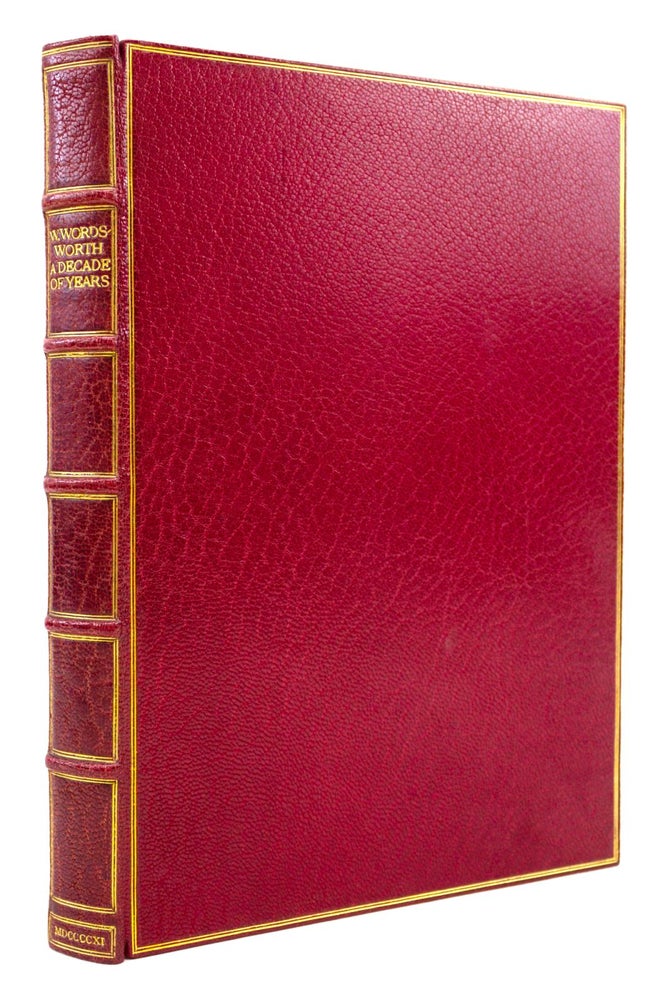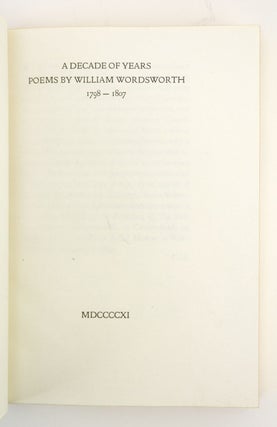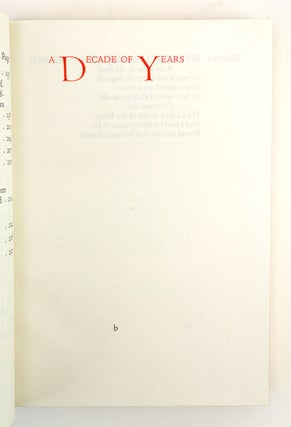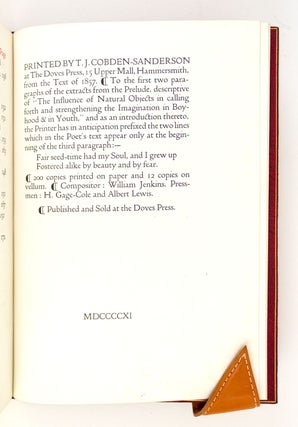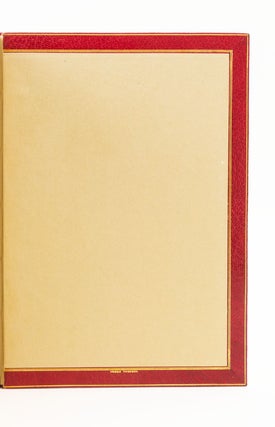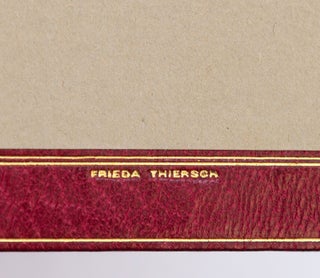A DECADE OF YEARS.
(Hammersmith: Doves Press, 1911). 235 x 165 mm. (9 1/4 x 6 1/2"). 230 pp., [1] leaf. ONE OF 200 COPIES ON PAPER (and 12 on vellum).
FINE RED CRUSHED MOROCCO BY FRIEDA THIERSCH (stamp-signed on rear turn-in), covers with double gilt fillet border, raised bands, double gilt-ruled compartments, gilt titling, turn-ins with gilt French fillet, all edges gilt. In the matching morocco-lipped marbled paper slipcase lined with fleece. Printed in red and black. Front flyleaf with tiny oval "E K" stamp of Ernst Kyriss. Tidcombe DP-25; Tomkinson, p. 56. ◆AN EXTRAORDINARILY FINE, EXCEPTIONALLY BRIGHT COPY, little changed from the day it left the bindery.
This is an excellent example of the fine printing produced by T. J. Cobden-Sanderson and Emery Walker at the Doves Press and the fine work done by Frieda Thiersch, the German binder who had trained with the former head of the Doves Bindery, Charles McLeish. That master artisan wrote of his pupil, "Miss Thiersch became the most skillful pupil we ever had and we considered her, at the time of leaving us [in 1912], equal to any professional." Thiersch has clearly drawn on her studies with McLeish for the design of this binding, which brings to mind the simple elegance of Doves bindings, as well as for the flawless execution. Upon completing her apprenticeship with McLeish, Thiersch (1889-1947) worked for Leipzig art bookbinder Carl Sonntag before opening her first workshop in Berlin in 1913. Soon thereafter, she became the principal binder for Willy Wiegand's Bremer Presse, while continuing to create bindings for discriminating collectors. Thiersch bindings are of two sorts: those she bound with her own hands bear her full name (as here), whereas books bound by her workers under her supervision were signed with her initials instead. When financial difficulties forced Wiegand to close the Bremer Presse in 1934, Thiersch's business was hard hit, and she was forced to turn to a sinister new source of employment. The emerging Nazi party was attracted to Thiersch's work by her international reputation, and she soon became the binder of choice for the party and for Hitler himself, creating document folders, guest books, photo albums, and so on.
The present Doves publication is highly sought after both because of its limited press run and its content, which Cobden-Sanderson greatly admired for its "cosmic" quality. Tidcombe tells us that in the present anthology, the publisher "selected the poems to build one great poem, as Wordsworth himself had intended." As Cobden-Sanderson says, the verses begin and end with Nature, being linked together "in one chain of emotion, rising and falling, expanding and contracting, as is the manner of emotion itself." Perceiving in Wordsworth's works a recourse from the violence of the world, Cobden-Sanderson sent a copy of this book to his old friend Bertrand Russell, who had been imprisoned for his pacifist pronouncements during the Great War.
It is not surprising that this beautiful specimen of the book arts has distinguished provenance: it was previously owned by Ernst Kyriss (1881-1974), an eminent scholar of bookbinding history whose four-volume work on early German book stamps is a classic in the field. He was also a collector of books in special bindings from all periods, and he had a great fondness for press books, especially those printed on vellum. It is not unreasonable to suppose that Kyriss commissioned this binding from Thiersch. (ST16972)
Price: $8,500.00

